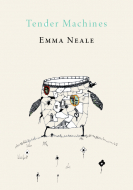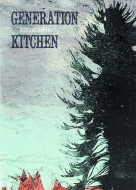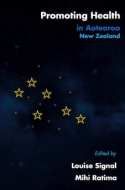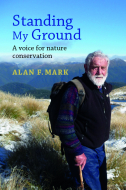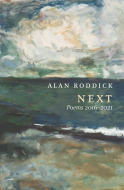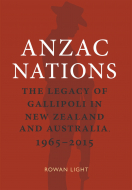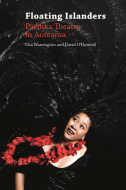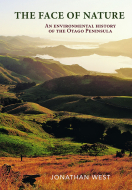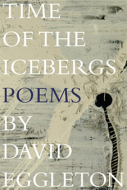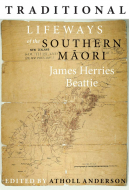
- Agriculture
- Architecture & Design
- Arts & Photography
- Biography
- Business
- Calendars and Diaries
- Childrens (All)
- Childrens (Illustrated)
- Childrens (Picture flats)
- Childrens (Te Reo)
- Classics
- Cooking, Food & Drink
- Craft & Hobbies
- Design (Art / Graphics)
- Design (Interiors)
- Education
- Fashion
- Fiction & Literature
- Fiction - Young Adult
- Gift Ideas
- Health & Wellbeing
- History
- Home & Garden
- Humour & Gift
- Instead of a Card Poems
- Military
- Music
- New Zealand
- NZ (History)
- NZ (Landscapes)
- NZ (Pictorial)
- Poetry
- Reference
- Religion & Faith
- Science & Nature
- Sport & Recreation
- Stationery
- Taschen : 40th Anniversary Edition
- Taschen : BA Basic Art
- Taschen : BU Bibliotheca Universalis
- Te Reo Māori
- Transport
- Travel
Otago University Press (198)
|
Tender Machines
ISBN: 9781927322345 Author: Emma Neale Publisher: Otago University Press In this follow-up collection to the award-winning The Truth Garden, Emma Neale asks where exactly do the personal and the political drop hands? In poems that ar... In this follow-up collection to the award-winning The Truth Garden, Emma Neale asks where exactly do the personal and the political drop hands? In poems that are engaged, compelling, witty and moving, she looks at how we navigate a true line through the psychological, environmental, social and economic anxieties of our times. The book examines love in its many guises, and also energetically responds to the distractions and delights of the digital age. Writing of Emma Neale’s ‘kitchen-familiar and cosmic-wide attentions’, Poet Laureate Vincent O’Sullivan has said, ‘There is something so celebratory about Emma Neale’s poetry, about its eager, informed, needle-eyed engagement with the contemporary world … [She runs] the hot thread of linguistic flare and precision through whatever occasion she takes up.’ Bind: paperback Pages: 80 Dimensions: 160 x 230 mm Publication Date: 03-07-2015 |
$25.00 |
|
|
Generation Kitchen
ISBN: 9781877578922 Author: Richard Reeve Publisher: Otago University Press Much sought after by oil companies, ‘generation kitchens’ are sites where geological forces have combined to create conditions for oil production. By turns ... Much sought after by oil companies, ‘generation kitchens’ are sites where geological forces have combined to create conditions for oil production. By turns brooding and wittily observant, Richard Reeve’s fifth book of poetry meditates on the intrigues of fossil fuel companies and ecological despoliation, but also on personal rites of passage – on relationships, deaths, the turn of the seasons. Comic monologues, spiritual invocations, flung swearwords, elegies, eulogies, wind tunnel diatribes and fanciful phantasmagorias co-exist in this collection. Oracular and bardic, Reeve’s work is also paradoxically down to earth and gritty. He knows that, beyond the geopolitical framework, beyond the anthropocene moment, the landscape endures, as in the poem ‘Warrington Dives’: the bright swell bending around the coast, prodding the dark, clouds of sediment thrown up by a wave … Bind: paperback Pages: 64 Dimensions: 150 x 220 mm Publication Date: 03-07-2015 |
$25.00 |
|
|
Promoting Health in Aotearoa NZ
ISBN: 9781877578823 Author: Louise Signal Publisher: Otago University Press The health of the planet – and all of us who live on it – is under dire threat from factors such as climate change, obesity and new infectious diseases. Pro... The health of the planet – and all of us who live on it – is under dire threat from factors such as climate change, obesity and new infectious diseases. Progressive health promotion is an approach that can counterbalance these threats with practice, policy and advocacy for health, well-being and equity. Promoting Health in Aotearoa New Zealand provides a rich scan of the health promotion landscape in New Zealand. It explores ways in which Māori, and other, perspectives have been melded with Western ideas to produce distinctly New Zealand approaches. In doing so it addresses the need for locally written material for use in teaching and practice, and provides direction for all those wanting to solve complex public health problems. Bind: paperback Pages: 256 Dimensions: 150 x 230 mm Publication Date: 03-07-2015 |
$45.00 |
|
|
Standing My Ground
ISBN: 9781927322048 Author: Alan Mark Publisher: Otago University Press For more than five decades, Alan Mark has been a voice for conservation in New Zealand. From his call in the 1960s for the establishment of tussock-grassland re... For more than five decades, Alan Mark has been a voice for conservation in New Zealand. From his call in the 1960s for the establishment of tussock-grassland reserves in the South Island high country to his involvement in the 2011–13 campaign to save the Denniston Plateau from mining, he has been a passionate and effective advocate for the preservation of areas of ecological importance. Alan’s conservation activities have paralleled – and are informed by – a distinguished academic career as a botanist and ecologist. A member of Otago University’s Botany Department from 1955 until his retirement as Professor and Head of Department in 1998, he has run and participated in numerous research projects, taught and mentored thousands of students and published 200 academic papers. In Standing My Ground, Alan describes the challenges and achievements, the frustrations and successes that have made up his remarkable life, now in its ninth decade. A revered figure in the conservation movement, rewarded for his contribution by a knighthood in 2009, he has also endured his share of criticism and insult, which he has weathered with the support of Otago University and his family. As well as providing an important record of New Zealand’s conservation battles and documenting the life of an outstanding New Zealander, Standing My Ground is an inspiring reminder of the power of individuals to make a difference. Bind: paperback Pages: 284 Dimensions: 150 x 230 mm Publication Date: 04-09-2015 |
$45.00 |
|
|
Next: Poems 2016-2021
ISBN: 9781990048319 Author: Alan Roddick Publisher: Otago University Press … Between-times, there’s silence to attend to, setting an edge on hearing, for what happens – dokadok-dok, freight wagons heading north; then that diesel ... … Between-times, there’s silence to attend to, setting an edge on hearing, for what happens – dokadok-dok, freight wagons heading north; then that diesel thrum, a fishing vessel, and the first truck, changing down, clears its throat. Soon, the city-stir will say Start here as graylight brings Level 2. What happens now? Today. Then today. And then, today. – From ‘At Last – Level 2’ Writing from the eighth and ninth decades of his life, Alan Roddick’s third collection of poetry, Next, examines the past, observes the present and speculates on the future. Anchored in the action of daily life – whether it be a ride in a mirrored elevator or a roadside conversation with a friend – his poems speak of migration, family, friendship, aging and mortality. Next is marked by a rare blend of uncompromising vision and deep compassion. Here is poetry that delights in warmth, humour, wit and grace, that revels in the beauty of the world, that insists on ‘anticrepuscular rays’ at twilight even as it’s asking the niggling question: ‘Tomorrow, though? …’Roddick’s most simple poems are also his most potent. – Elizabeth Morton, in NZ Poetry Yearbook, 2018 AUTHOR Alan Roddick was born in Belfast, Northern Ireland, and emigrated to New Zealand in 1952. He is the literary executor for Charles Brasch and has edited numerous books including Charles Brasch: Selected Poems (OUP, 2015). Next is Roddick’s third book of poetry: his first collection, The Eye Corrects, was published in 1967 and was followed 49 years later with Getting It Right (OUP, 2016) Bind: paperback Pages: 82 Dimensions: 150 x 230 mm Publication Date: 28-01-2022 |
$27.50 |
|
|
ANZAC Nations: The legacy of Gallipoli in New Zealand and Australia 1965 - 2015
ISBN: 9781990048203 Author: Rowan Light Publisher: Otago University Press The legacy of Gallipoli has become one of the most powerful expressions of national belonging in New Zealand and Australia in recent years. But this wasn’t a... The legacy of Gallipoli has become one of the most powerful expressions of national belonging in New Zealand and Australia in recent years. But this wasn’t always the case. In Anzac Nations: The legacy of Gallipoli in New Zealand and Australia, 1965–2015, author Rowan Light examines the myth-making around Anzac and how commemoration has evolved – from 1965, when many assumed that the tradition of remembering the Anzacs would not survive beyond the death of the last Gallipoli veteran, to the Anzac Centenary in 2015 when the Australian federal government outspent all other countries, and New Zealand’s centenary programme was the largest commemoration in the country’s history. Anzac Nations explores how societies make meaning and express value and beliefs through practices such as remembrance and commemoration. Why do we see the Gallipoli campaign, fought over a hundred years ago in a far-flung corner of the world, as an expression of national belonging? What shapes this collective remembrance in Australia and New Zealand and how do commemorations differ between the nations? Who has authority over what is – and is not – remembered on 25 April, and why does this national memory focus so heavily on the place and experience of Gallipoli, rather than on other aspects of past violence at home or abroad? Anzac Nations examines three key aspects: the changing and contested meanings of Anzac from the 1960s to the 1980s; the expanded role of the state in commemoration since 1990; and responses to these shifts by Indigenous and non-Indigenous communities. In Anzac Nations, Light brings together stories and evidence from both sides of the Tasman, offering a sweeping panorama of memory that includes writers and filmmakers, protestors and prime ministers, and public audiences who have come to see Anzac Day as their own. AUTHOR Rowan Light is a Pākehā historian at the University of Auckland Waipapa Taumata Rau where he teaches Aotearoa New Zealand histories. He is also project curator at the Auckland War Memorial Museum Tāmaki Paenga Hira, assisting with research on the history, remembrance and commemoration of the New Zealand Wars. Bind: paperback Pages: 256 Dimensions: 240 x 170 mm Publication Date: 01-03-2022 |
$50.00 |
|
|
Floating Islanders
ISBN: 9781988531076 Author: Lisa Warrington Publisher: Otago University Press 'We float – we’re not based in one place – we’re floating Islanders. I always come back to theatre, theatre is my first home.’ – Makerita Urale This... 'We float – we’re not based in one place – we’re floating Islanders. I always come back to theatre, theatre is my first home.’ – Makerita Urale This book celebrates 30 years of Pasifika theatre in Aotearoa/New Zealand. Pacific Underground, Pacific Theatre, The Laughing Samoans, The Conch, The Naked Samoans, Kila Kokonut Krew – the distinctive style and themes of Pasifika theatre have been developed by many individuals and theatre companies in New Zealand. Authors Lisa Warrington and David O’Donnell have interviewed over 30 theatre practitioners to tell the story of Pasifika theatre in Aotearoa from 1984 to 2015. This lively book showcases playwrights, directors and performers whose heritage lies in Samoa, Niue, Fiji, Tonga, Tokelau and the Cook Islands. Extracts from the interviews are threaded throughout the book, providing often entertaining insights into their history and creative practice. While the immigrant experience of living in two worlds is often seen as troubled, the authors suggest that this ‘in-between-ness’ has been turned to advantage in Pasifika theatre to create a unique and often subversive performance phenomenon. Not only is Pasifika theatre a success story within the performing arts in New Zealand, it is also an intriguing case study of migrant theatre that has international resonance. Bind: paperback Pages: 284 Dimensions: 155 x 235 mm Publication Date: 01-11-2017
Tag: New Zealand |
$39.95 |
|
|
The Face of Nature
ISBN: 9781927322383 Author: Jonathan West Publisher: Otago University Press Bounded by the wild waves of the Pacific on the east, and the more sheltered harbour on the west, the Otago Peninsula is a remarkable landscape. Today a habita... Bounded by the wild waves of the Pacific on the east, and the more sheltered harbour on the west, the Otago Peninsula is a remarkable landscape. Today a habitat for a diverse array of wildlife including albatrosses, penguins and seals, the Peninsula has undergone dramatic changes since it first attracted human settlement. In The Face of Nature: An environmental history of the Otago Peninsula Jonathan West explores what people and place made of one another from the arrival of the first Polynesians until the end of the nineteenth century. The Peninsula has always been one of the places in Otago most important to Māori. In 1844 they reluctantly agreed to split it with the British, but the land Māori retained has remained at the core of their history in the region. The British settlers divided their part of the Peninsula into small farms whose owners transformed it from native forest into cow country that fed a booming Dunedin – at that point New Zealand’s leading commercial city. This rigorously researched, beautifully illustrated local history documents the rapid environmental change that ensued, which went far beyond the transformation from forest to farm, to the loss of birds, the exhaustion of inshore fisheries, eruptions of pests and weeds, enormous sand-blows, and huge and sometimes sudden landslides. The speed and scope of change driven by human occupation of the Peninsula were summed up in 1901 by George Malcolm Thomson, natural scientist and historian. In just 50 years, he said, ‘the whole face of Nature is altered’. Already, alongside pride in what they had made of the Peninsula, settlers felt remorse for the losses they had caused. The Face of Nature incorporates a rich array of maps, paintings and photographs to illustrate the making – and unmaking – of this unique landscape. In doing so it illustrates why the Otago Peninsula is an ideal location through which to understand the larger environmental history of these islands. Bind: paperback Pages: 388 Dimensions: 170 x 240 mm Publication Date: 05-12-2017 |
$49.95 |
|
|
Time of the Icebergs
ISBN: 9781877578021 Author: David Eggleton Publisher: Otago University Press Much of Time of the Icebergs was written while David Eggleton was a Writer-in-Residence at the Michael King Writers Centre in Auckland in 2009. These are poems ... Much of Time of the Icebergs was written while David Eggleton was a Writer-in-Residence at the Michael King Writers Centre in Auckland in 2009. These are poems about the world we live in, tracing a dystopian present 'hurtling globalisation's highway' where 'Google tells Google that Google saves'. As he says, 'I think of it as a collection for browsing and discovering things: soundscapes, seascapes, landscapes, contemporary politics and contemporary people, histories, traditions, and other things besides.' In this time of winebars and infotainment, 'Ngati Cappucino and Ngati Bogan' stalk the streets bent beneath hoodies and 'boxy four-wheel-drives plane through the wet' piloted by 'yummy mummies'. Titles of poems reflect the absurdities of 21st century existence: 'Kate Winslet Promotes a Credit Card' riffs off an ad in the New Yorker, while 'Not for Human Consumption' and 'Twenty Second Century' hint at the ecological chaos of the modern world. Name-droppers, debt-dodgers, ghettoised gods and 'Vern Acular, that good keen bloke' all make an appearance, as does the lost five-cent coin. Poems set in Suva, Sydney, Christchurch, Auckland and Dunedin locate this book firmly in the South Pacific. Eggleton traverses the country: from Cantabrian landscapes of 'a geology sculpted into fists' and Dunedin 'tipped out of a colonial toy-box' to North Island summer idylls where you could 'follow a jiggle-string of beach pulled taut by the soaraway kite of blue sky'. Nationality and 'kiwiness' are under investigation. This is no mere intellectual exercise as through it all thrums the steady beat of life. Bind: paperback Pages: 88 Dimensions: 140 x 210 mm |
$25.00 |
|
|
Traditional Lifeways of the Southern Maori
ISBN: 9781990048630 Author: James Herries Beattie Publisher: Otago University Press Journalist James Herries Beattie recorded southern Māori history for almost fifty years and produced many popular books and pamphlets. Traditional Lifeways of ... Journalist James Herries Beattie recorded southern Māori history for almost fifty years and produced many popular books and pamphlets. Traditional Lifeways of the Southern Māori is his most important work. This significant resource, which is based on a major field project Beattie carried out for the Otago Museum in 1920, was first published by Otago University Press in 1994 and is now available in this new edition. Beattie had a strong sense that traditional knowledge needed to be recorded fast. For twelve months, he interviewed people from Foveaux Strait to North Canterbury, and from Nelson and Westland. He also visited libraries to check information compiled by earlier researchers, spent time with Māori in Otago Museum recording southern names for fauna and artefacts, visited pā sites, and copied notebooks lent to him by informants. Finally he worked his findings up into systematic notes, which eventually became manuscript 181 in the Hocken Collections, and now this book. Editor Atholl Anderson introduces the book with a biography of Beattie, a description of his work and information about his informants. Beattie wrote a foreword and introduction to the Murihiku section, which are also included here. Bind: paperback Pages: 640 Dimensions: 155 x 230 mm Publication Date: 22-02-2024 |
$60.00 |


